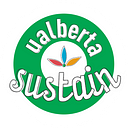Unlearning colonialism to overcome the climate crisis
Education professor Dwayne Donald on his work’s connections to sustainability

By Jenna Bell
You’ve likely seen or heard something like this before:
The University of Alberta acknowledges that we are located on Treaty 6 territory, and respects the histories, languages, and cultures of the First Nations, Métis, Inuit, and all First Peoples of Canada, whose presence continues to enrich our vibrant community.
Land acknowledgements are increasingly common before speeches, lectures or even emails. As someone who was raised in Western culture with some Métis ancestry, I have always been curious about what exactly it meant to be on “Treaty 6 territory.” In grade school, I learned that Treaty 6 was an agreement signed by the Crown and Cree, Assiniboine and Ojibwa leaders in 1876. But what does it mean today to be living on Indigenous land?
U of A professor Dr. Dwayne Donald confronts these difficult issues head-on. As a descendent of the Papaschase Cree and professor in education, Dwayne is dedicated to sharing and integrating Indigenous knowledge into the public school curriculum. By challenging his students to think critically about different knowledge systems, he points to new ways of tackling complex issues like climate change.
From your position in the Faculty of Education, what have you learned about approaching systemic issues like climate change?
When we face problems like climate change or sustainability, my view is that we tend to reflect or replicate the philosophies and worldviews that got us to this point. We continue to draw on them consistently — rework them and re-present them as though these philosophies will have no replacement, [as if] there will be nothing superior to those that have gotten us to this point.
If those philosophies aren’t working for us, then where can we look? That’s a question I often ask students. What could be our sources of inspiration? How can we bring these together?
How does your research address this impoverishment of inspiration?
A lot of my research is this curiosity about cultural assumptions — especially in terms of curriculum. I look at how we understand what it means to be a human being and the ways in which knowledge systems promote certain kinds of human beings. I see a lot of the interactions in education and other places between Indigenous people and Canadians as a very complex cultural problem — in which the possibility of repairing these relationships is often blocked by colonial logics.
What does that mean for you, as an educator?
The research project that I’m most interested in right now is what I’m tentatively calling unlearning colonialism. I have a lot of faith in public education. But I do think that we have a particular challenge in front of us in terms of how young people are brought to understand themselves in relation to the place where they live. Right now, we don’t really do a very good job with that. Most of what happens in schools is based on a logic of placelessness and the colonial process of relationship denial.
I think that if we can let go of the factory system model, as well as the need to continually worship certain knowledge insights and approaches to knowledge — then we can begin to connect young people to different ways of understanding life and living.

What kind of relationship do you want (young) people to have with Treaty Six?
Personally, I take a lot of inspiration from that act of love that we call Treaty Six. I consider it an act of love because those old people at that time tried really hard to imagine what our challenges were going to be, and what we were going to need. This treaty was guided by a vision of kinship that includes all the life around us, not just humans.
We agreed to live in peace and friendship — we agreed to share. To forget about that; isn’t that violating the treaty? We need to go back to that act of love and the wisdom that’s there. My passion is to connect people to the wisdom of my ancestors.
You are well-known for your “River Valley Walk,” where you take participants for a two-hour hike along the North Saskatchewan River as you explain the history of Indigenous Peoples in Edmonton. What do you value about leading these tours?
The River Valley Walk is a personal inquiry as I continue to search for balance in my own life and continue to try to heal myself. To be in a position where I can invite other people to participate in that and learn with me is really meaningful. I haven’t invented anything related to the walk. Everything I share in the walk are insights that were shared with me by other people or things I have read.
I’m committed to and passionate about the River Valley Walk because I believe that a key part of the educational project in Canada today involves repairing the relationships between Indigenous peoples and Canadians and renewing them on more ethical terms. Being in the river valley and beside the river helps people reframe the problem of reconciliation as including relationships to the forms of life that sustains us all. The key to this is helping people connect to the place where they live in a holistic way. It’s through those connections that more ethical forms of relationality can be generated — with both human and more-than-human relations.
To hear more of Dwayne Donald’s thoughts on this topic, please join us on Thursday, Jan. 23 at Noon in SAB 1–36 for “Homo Economicus and Forgetful Curriculum: Remembering other ways to be a human being.”
This interview has been edited for clarity and length.
